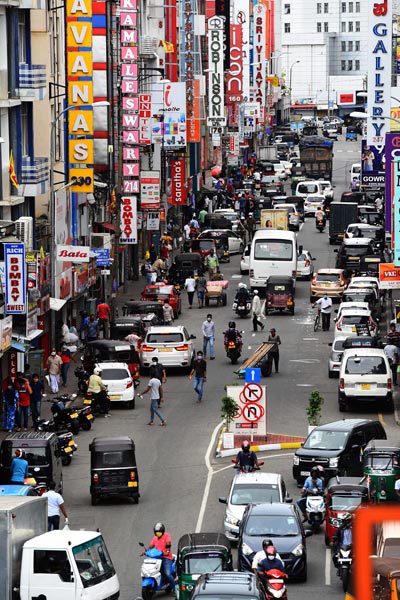Monday Feb 16, 2026
Monday Feb 16, 2026
Monday, 1 January 2024 05:12 - - {{hitsCtrl.values.hits}}
 A new Value Added Tax (VAT) regime will come into force from today amid widespread criticism from the public and Opposition political parties, and concern by almost all key economic sectors.
A new Value Added Tax (VAT) regime will come into force from today amid widespread criticism from the public and Opposition political parties, and concern by almost all key economic sectors.
The rate of VAT on existing applicable goods and services will increase by 20% from 15% to 18% while a larger number of new items including fuel, gas, chemical fertiliser, telecommunication, milk, poultry, etc will for the first time be subject to VAT and that too at record high of 18%. However, the Government defended the move saying nearly 90 types of items, including educational services, electricity, health, medicine, passenger transportation, as well as all vegetables and fruits, are exempt from VAT. Additionally, VAT does not apply to 65 types of items subject to the Special Commodity Levy.
Separately the turnover threshold applicable for VAT was reduced to Rs. 60 million from Rs. 80 million to widen the coverage.
Increasing the VAT or income via a higher rate and coverage of goods and services was warranted to meet revenue targets set under the IMF’s four-year $ 3 billion Extended Fund Facility (EFF) program under which the Government has already drawn over $ 600 million.
President’s Office State Revenue Unit Director K.K.I Eranda last week stressed the importance of VAT as a primary revenue generation tool for the country. According to him, the initial expectation of VAT revenue in 2023 was over Rs. 600 billion, but only around Rs. 450 billion had been collected. With the new regime, the Government expects to garner a whopping Rs. 1.4 trillion through VAT in 2024. The Government has identified tax leakage factors, both external and internal, as well as tax exemptions, contributing to the revenue shortfall. Consequently, efforts are being made to increase the number of taxpayers and reduce tax exemptions, Eranda told journalists.
Irrespective of revenue goals, the new VAT regime even before its implementation irked multiple economic sectors such as tea, construction, gems and jewellery, renewable energy, confectionery, retail and others. Some of these industries warned they would go bust due to the new VAT regime. Despite widespread concerns, the Government has not responded nor appeared to be sympathetic.
The public and consumer panic over a higher VAT rate saw them rushing to buy products at the lower 15% rate by yesterday. Fuel queues were back too with motorists keen to avoid paying a higher price from 1 January. To cushion the impact the Government removed the 7.5% PAL on fuel and the 2.5% PAL on LPG though overall both will be expensive.
Political analysts said the new VAT regime is politically suicidal and feared whether President Ranil Wickremesinghe will be a victim of VAT or be vanquished by VAT. Main Opposition Samagi Jana Balawegaya and the JVP/NPP have been agitating against the new regime for several weeks and have warned of protests in the new year.
Given the political repercussions, the dominant Sri Lanka Podujana Peramuna (SLPP) has told MP Dhammika Perera and other Presidential aspirants to come up with a strategy to reduce VAT to 15% by finding alternative revenue sources. It was the short-lived President Gotabaya Rajapaksa regime that reduced VAT from 15% to a low of 8% as relief to people and a boost to the private sector though it created a revenue drop for the Government.
Central Bank Economic Research Department Deputy Director Janaka Edirisinghe last week revealed that it is projected that inflation would increase by 2-3% due to rising prices. However, he mentioned that the Finance Ministry and the Inland Revenue Department are actively working to provide relief by removing other taxes on goods and services subject to value-added tax and making necessary tax adjustments. As a result, there is a possibility that the predicted rate of increase in inflation may decrease further.
Comparing global standards, President’s Office Director General of the State Revenue Unit M.J. Gunasiri highlighted that in many countries, VAT revenue constitutes between 6-8% of the Gross Domestic Product (GDP). However, in Sri Lanka, the VAT revenue for the current year is at 2.2% of GDP. The expectation is to increase VAT revenue to around 4% of GDP in 2024.